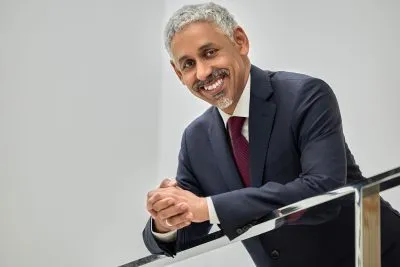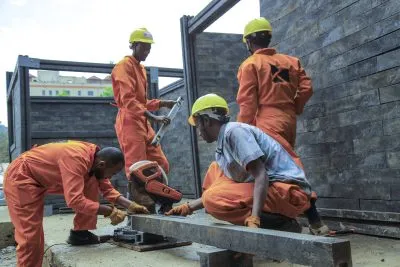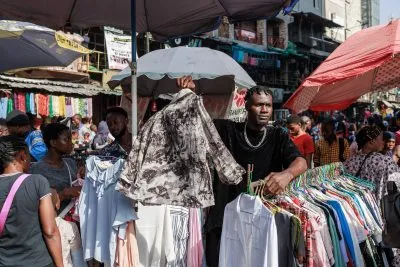On every working day, the banking halls are full and bustling with activity. The queues at the managers’ offices are also long. To secure an appointment with most bank managers requires patience. Not because of bureaucracy but because of the demand.
“In the next 20 years, South Sudan will be a booming economy. This is the right time to be here,” Paul Gitahi, Equity Bank South Sudan Executive Director, says.
Gitahi recalls vividly what it was that drove his bank into South Sudan, which many investors and global financial brands still view as a high-risk market. “It is the vision of the bank to become a pan-African bank that informed us to come here,” Gitahi reveals. “We had an option to venture into stable countries like Tanzania and Rwanda first before coming here. But South Sudan was an emerging economy. The global business trends lately are shaped by the paradigm set by newly established industrialised nations. This is what informed our decision to start our operations in Juba and we are now all over South Sudan.”
Equity Bank was not the only bank to dare the still waters of Juba. If anything, it was the second international bank to follow Kenya’s banking giant Kenya Commercial Bank (KCB). A few months after the CPA was signed, KCB (Sudan) Limited was incorporated, making it the first international bank to set up its base in the new nation. Today KCB Sudan, with its headquarters in the Wizarat area, has 19 branches spread over South Sudan’s 10 states.
“This country has got lots of potential. It is vast and is endowed with immense agricultural potential, with 80% of its land being arable with suitable rains,” says Gitahi. “South Sudan also has numerous mineral deposits and has an eager population willing to make good use of the resources at their disposal and a leadership that has a global outlook.”
Addis Ababa and Khartoum too have have not been slow to see the opportunities, with the Commercial Bank of Ethiopia (CBE) and Bank of Khartoum Juba opening subsidiaries.
European, South African and West African-domiciled multinational banks, however, are yet to set foot in South Sudan. Ivory Commercial Bank, Nile Commercial Bank, Mountain Trade and Development Bank and Agricultural Bank of Sudan are the indigenous banks standing up to the stiff competition posed by the international banks from Kenya, Ethiopia and Sudan.
“The specialised expertise of international financial institutions like Equity Bank is needed to augment existing efforts in the Republic of South Sudan by our government for this newly born nation to have a stable monetary system capable of supporting economic growth, prosperity and development in all the sectors of the economy,” Daniel Gwagwe, the director of banking supervision at the Central Bank of South Sudan (CBSS), says.
New life for old banks
John Buong Dhieu, the Administration Manager of Ivory Bank, describes the situation a few years earlier. “Few Southerners were allowed to work in the banking sector. There was no investment in Juba and the Khartoum government ensured this,” he says. “In 1994 a consortium of South Sudan business people came together and founded Ivory Bank, which is an indigenous bank for the Southerners. It was set up in Khartoum and adopted a conventional banking system model to meet the needs of the Southerners, most of whom were not familiar with the Sharia model.”
After the signing of the CPA, the government of South Sudan bought up 85% of Ivory Bank, becoming the majority shareholder, and the remaining 15% was left to the public. Ivory Bank, which is at the heart of Juba’s fledgling Central Business District, is expected to encourage home-grown players in the nascent financial sector.
“Being the youngest nation, our banking sector is just beginning to pick up,” Dhieu says.
“We are competing with accomplished foreign bankers with massive capital investments and experience in the field and this does not scare us. So far we are all on an equal footing and even though the government is a majority shareholder, we receive no favours.”
Exactly two weeks before appointing a new cabinet, President Salva Kiir sent a strong message that his government was keen on getting it right on the financial sector and the judiciary when he relieved Elijah Malok Aleng as the Governor of the Central Bank of South Sudan (CBSS) and John Wol Makec as Chief Justice of the Supreme Court of South Sudan Justice. The appointment of Kornelio Koriom Mayik as the new governor calmed the financial sector. Kornelio, who was formerly the first General Manager of Ivory Bank and the immediate former chairman of the South Sudan Currency Conversion Committee, is respected by the banking sector in Juba.
“Kornelio is an old banker who understands the situation and the huge hopes and aspirations expected of the CBSS. At this point in time, he is the best man to steer us,” Dhieu says.
Recruit locally
One of the major hurdles that banks and other institutions face is the lack of suitable manpower. When Equity first entered the market, they advertised vacancies in the local media. There was not a single applicant. Then one evening during a board meeting, recalls Gitahi, a bright idea struck one of the directors.
“In one of those moments when you reach a deadlock and are confronted by a difficult decision this idea just popped up. Why not visit all Kenyan universities and recruit South Sudan students who are almost completing their studies? We did this and we got all the staff we needed for the South Sudan operation.”
Equity appears to have discovered the magic key to business success in South Sudan. “There is one thing we never failed to bring here in Juba. This was our family emotional bond with our customers. The same way we demystified banking in Kenya and managed to make customers relate to us, is the same way we have managed to break even here,” Gitahi asserts. “The move to hire South Sudanese in the diaspora has helped us greatly. And it has paid dividends. It has become easy to sell our bank to the South Sudanese.”
Today Equity has a staff of 130, 80% of whom are South Sudan nationals.
A week after our interview with Gitahi, Equity Bank South Sudan opened its fourth branch, which will be known as Bilpham, in Juba, situated at the SPLA Headquarters.
Equity Bank’s chief Executive, James Mwangi, said, “In the last two years we have made significant milestones. We have been motivated by our achievements in South Sudan. We are responding to the aspirations of the people in the East African region to have a single market. We want to be a facilitator of the new trend of inter-country trade in the region.”
Want to continue reading? Subscribe today.
You've read all your free articles for this month! Subscribe now to enjoy full access to our content.
Digital Monthly
£8.00 / month
Receive full unlimited access to our articles, opinions, podcasts and more.
Digital Yearly
£70.00 / year
Our best value offer - save £26 and gain access to all of our digital content for an entire year!

 Sign in with Google
Sign in with Google 





